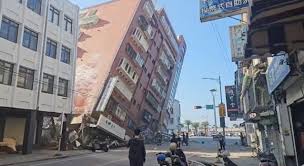At least 10 people died and more than 1,000 were injured on Wednesday when the powerful quake, Taiwan’s strongest earthquake in 25 years, sent boulders and mud tumbling down mountainsides, blocking roads and damaging ground floors of some buildings that collapsed, leaving them leaning at precarious angles
“There are systems in place. It just needs to be activated. It helps save time (in rescue), how many people are to be sent, where etc. There are protocols in place … there is no confusion. The accountability is very high,” said Sana Hashmi, a research scholar with a think tank
Taipei:
India and other countries could learn from Taiwan about having and implementing strict building codes for quake-resistant buildings, an Indian research scholar who experienced Wednesday’s 7.4 magnitude earthquake said here on Thursday.
At least 10 people died and more than 1,000 were injured on Wednesday when the powerful quake, Taiwan’s strongest earthquake in 25 years, sent boulders and mud tumbling down mountainsides, blocking roads and damaging ground floors of some buildings that collapsed, leaving them leaning at precarious angles.
Media reports said that rescuers searched on Thursday for missing people and worked to reach hundreds stranded due to the quake at Hualien, about 200 km south of the capital of Taiwan.
“There are systems in place. It just needs to be activated. It helps save time (in rescue), how many people are to be sent, where etc. There are protocols in place … there is no confusion. The accountability is very high,” Sana Hashmi, a research scholar with a think tank, told PTI over the phone.
“There, the importance of human life is very high, everything else is secondary. You have to save people,” Hashmi, who works for the think tank Taiwan Asia Exchange Foundation for the last four years, said.
“How remarkable it is (the system in place). In any other country, the damage could have been devastating. But here it is so limited and damage is controlled and even the public transport was resumed in one hour,” she added.
When asked if there were obvious comparisons with her hometown Delhi, she said, “Can’t even think of it. It (would be) so chaotic. I don’t think, in India, a whole lot of buildings follow the codes. Not just in India but in a lot of countries … This is perhaps what a lot of us need to learn from Taiwan. There is always an opportunity in a crisis,” the research scholar said.
Hashmi, who came to Taipei City four years ago from Delhi, said initially she was a little afraid whenever there was a quake – “and let me tell you, quakes of smaller intensity keep happening here” – but soon she realised how calm and composed the people were.
“Like most other residents, I didn’t even come out of my home. I am on the eighth floor. The quake was indeed stronger and was for a longer duration. But all buildings are quake-resistant, so there was no fear,” Hashmi said.
“Yesterday’s quake was a high-magnitude quake, but it happened away from here. In Taipei, within hours, transportation was on track, buses, and metros were running and people went to their offices. It was business as usual soon,” Hashmi said.
A major reason why people remained calm and composed was because of the dual-purpose civil defence workshops. For Taiwan, facing quakes and typhoons is a norm.
“There are organisations that hold free workshops and awareness programmes for what needs to be done during typhoons, during quakes. It is very common, things are so normalised here. Even children are taught in school and act accordingly.”

